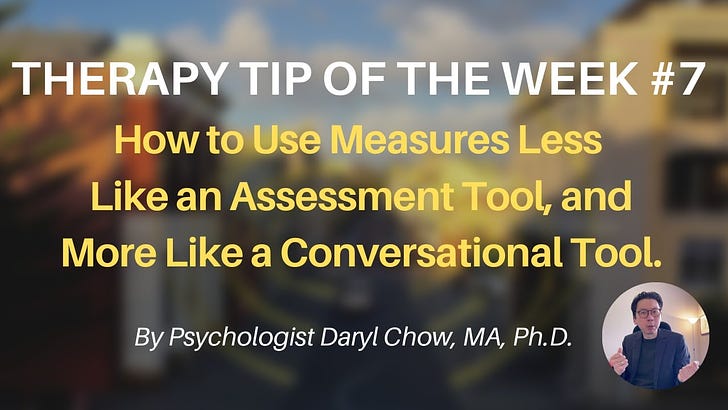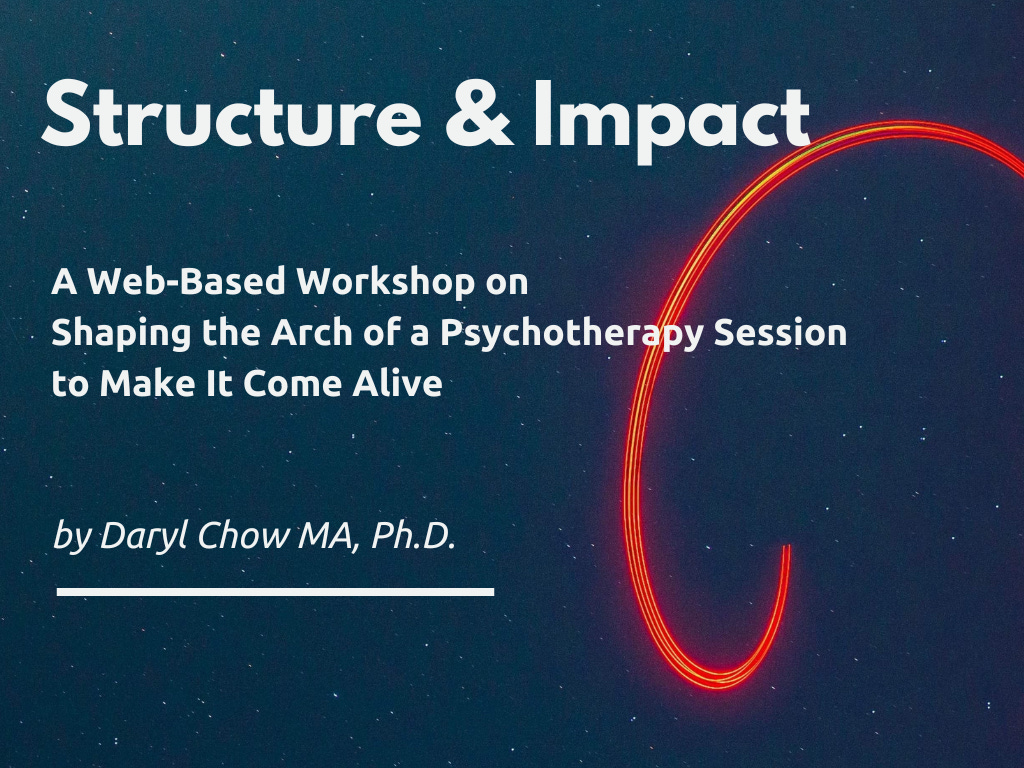Frontiers Friday 108 Alliance (Part V) ⭕️
1 New video, Clinical Tips on Receiving and Eliciting Feedback, Relevant Research Findings and A New Course on Creating a Structure in Therapy Sessions. Phew.
Let’s get straight to this week’s recommendations and reflection!
(Don’t forget about the upcoming Structure and Impact Course. See below.)
📽 New Video from Frontiers, Therapy Tip of The Week #7: How to Use Measures Less Like an Assessment Tool, and More Like a Conversational Tool
In this week's Therapy Tip of the Week #7 (TTW), I talk about how to use outcome monitoring tools, not as an assessment tool, but as a conversational tool.
Sidenote: There are backfire effects if we use measures purely as an assessment tool. See this: The Tyranny of Metrics⭕️ From the Frontiers Archives: How to Receive Feedback & How to Get Better at Eliciting Feedback
We talked about this in issue FF35, when we were discussing about Feedback-Informed Treatment (FIT).
This has direct implications on how we can directly calibrate in real-time so as to develop better alliance.⭕️ From the Frontiers Archives: To Get Useful Feedback, Seek Contrast
Don't underestimate the power of being cognisant of the previous session's engagement level.
In this blogpost, I talked about how you can use feedback and feed-it-forward, so that you can learn responsively adapt to each client.👀 Research: Therapist Alliance Activity, Therapist Comfort, and Systemic Alliance on Individual Psychotherapy Outcome
Jesse Owen has been a great collaborator. In this 2015 article with Norah Slone, they examined the systemic influence of alliance in individual therapy on outcome.Key Grafs:
Client outcome improves whenTherapists overtly checked in about the therapeutic alliance
Therapists were rated as being more comfortable, and
Clients’ social networks were aligned with goals and tasks of treatment.
⏸ Words Worth Contemplating:
"Remember: When people tell you something's wrong for them, they almost always right. When people tell you exactly what they think is wrong and how to fix it, they are almost always wrong."
~ Author, Neil Gaiman.
Reflection
Not all feedback is created equal.
Who specifically do you trust to give you feedback about your development?
It’s important to distinguish between performance feedback and learning feedback.
Feedback from clients are performance feedback, used to specifically tune and calibrate to individual's needs, one client at a time.
Feedback from a mentor/coach/supervisor are learning feedback, used to specifically help you with at your growth edge, one therapist at a time.
Yes, listen to to a crowd’s response if you are performing on stage. Their real-time responses give you a sense if you message, music or joke has landed. They can tell you what worked or didn’t, but they can’t tell you how to improve. Everyone will have a different opinion. They might even be able to tell you what's wrong, but not how to fix what's wrong.
Once again, not all feedback is created equal, even in terms of learning feedback. Be warned: What is guised as “feedback” is actually a performance “evaluation”.
Besides, an over-emphasis on performance can impede real learning.
In order for learning feedback to be useful, it has to be specific, targeted and contextually relevant. Theoretical discussions and affirmations aren't learning feedback. While needed at times, they aren't sufficient to lead to actual translation of better client outcomes.
(First appeared in Frontiers of Psychotherapist Development: The Guise of Feedback).
Structure and Impact Course
Last week, I introduced the new course, Structure and Impact. I received several emails asking the missing link and the promo code. This is now fixed. Apologies for the glitches.
The course is $200, and with the promo code, you'd get $80 off. Just key in at the checkout, 80GIFT. Easy peasy.
And if you are a student/trainee, the course if my gift to you. Click the enrolment page, scroll to the bottom to select the appropriate button.
Even though the course has not yet been released, people are saying things like, "Why don't they teach this in our program?"
The Structure and Impact course is specifically designed to help you shape the arch of a psychotherapy session so that you can make the psychotherapeutic encounter come alive.
I hope you’d join us.
Details:
Start: 10th of Oct 2022, World Mental Health Day.
Length: 1 month duration with 4 in-depth sections to Structure and Impact provided on a weekly basis.
Format: Interactive cohort-based, and self-paced (i.e., no need to log on at specific times).
Access: Not time-limited; Lifetime-Access.
Cost:
For Professionals: $200, with $80 off using the promo code: 80GIFT
For Trainees: Free.
(Some weeks ago, my friend said to me that this was a risky move. People could simply select the free option. I know. You could. I could ask for id proof that you are indeed a student. But I didn't build Frontiers of Psychotherapist Development to be transactional. We just have to rely on a handshake).
BIG HUGS TO NEW PEOPLE WHO ARE AT THEIR FRONTIER!
If you've just joined us, I'm glad you can join us at the "bleeding edge." Feel free to check out the back catalogue of Frontiers of Psychotherapists Development (FPD). You might also want to go into specific topics in the FPD Archives like
And if you want to see past newsletters, the entire archive is now made available in substack.
In case you missed it, see the most recent missives
Devotion to the Craft (6 Parts)
Caring for People in Organisations (3 Parts)
Clinical Supervision (3 Parts)
Feedback Informed Treatment (4 Parts)
Unintended Consequences (2 Parts)
Deep Learner (4 Parts)
Going Further with Deep Learner and The Use of Obsidian (6 Parts)
See What You Hear, Hear What You See (4 Parts)
Trauma (3 Parts)
Deliberate Practice (5 Parts)
Empathy (6 Parts)
Therapist Effects (2 Parts)
Client Point of View (4 Parts)
Tech Tools for Therapists (4 Parts)
Emotions (6 Parts)
Sensitivity (3 Parts)
My other blog site is called FullCircles: Reflections on Living
By the way, don't feel bad if you want to unsubscribe to this newsletter. This might not be for you. The last thing I want is to add to the anxious clutter of our inboxes.
Daryl Chow Ph.D. is the author of The First Kiss, co-author of Better Results, and The Write to Recovery, Creating Impact, and the forthcoming book The Field Guide to Better Results.
Note: These newsletter are free, many hours are spent handpicking the curated list that make it to Frontiers Friday, as well as writing the essays and recording the videos and podcasts. Amazon affiliate links, if any, are to help ease the cost of these missives.
P/s: Please excuse any typos!





